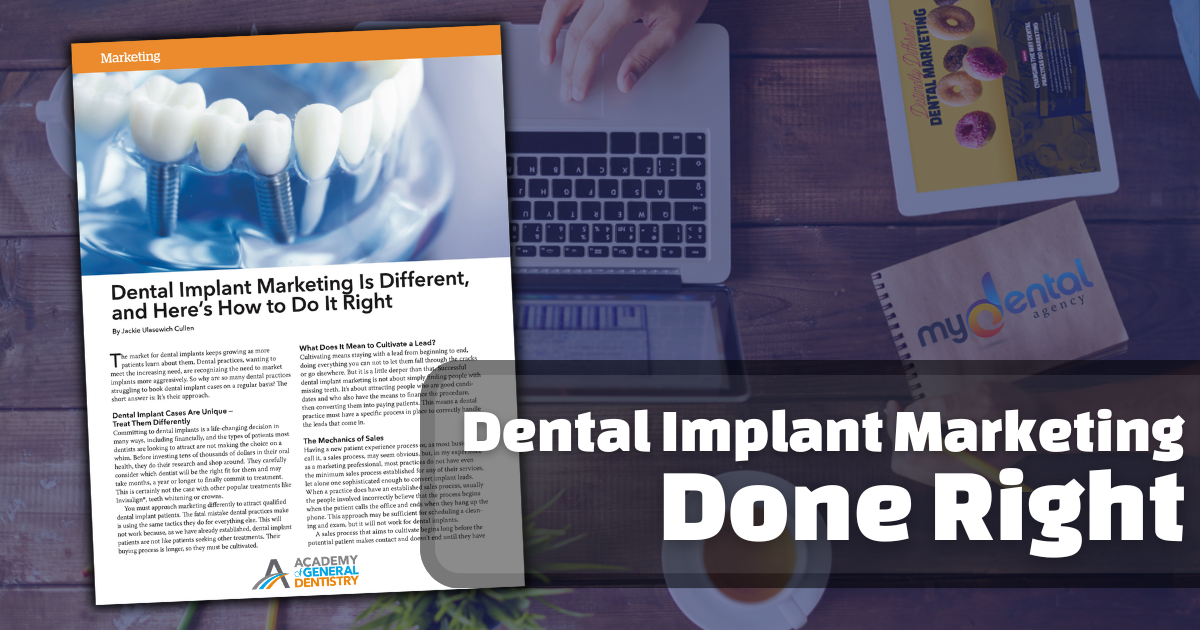This article originally appeared in the July/2024 issue of the Academy of General Dentistry’s AGD Impact magazine.
Dental Implant Marketing is Different, and Here’s How to Do it Right
By: Jackie Ulasewich Cullen
The market for dental implants keeps growing as more patients learn about them. Dental practices, wanting to meet the increasing need, are recognizing the need to market implants more aggressively. So why are so many dental practices struggling to book dental implant cases on a regular basis? The short answer is: It’s their approach.
Dental Implant Cases Are Unique — Treat Them Differently
Committing to dental implants is a life-changing decision in many ways, including financially, and the types of patients most dentists are looking to attract are not making their choice on a whim. Before investing tens of thousands of dollars in their oral health, they do their research and shop around. They carefully consider which dentist will be the right fit for them and may take months, a year or longer to finally commit to treatment. This is certainly not the case with other popular treatments like Invisalign®, teeth whitening or crowns.
You must approach marketing differently to attract qualified dental implant patients. The fatal mistake dental practices make is using the same tactics they do for everything else. This will not work because, as we have already established, dental implant patients are not like patients seeking other treatments. Their buying process is longer, so they must be cultivated.
What Does It Mean to Cultivate?
Cultivating means staying with a lead from beginning to end, doing everything you can not to let them fall through the cracks or go elsewhere. But it is a little deeper than that. Successful dental implant marketing is not about simply finding people with missing teeth. It’s about attracting people who are good candidates and who also have the means to finance the procedure, then converting them into paying patients. This means a dental practice must have a specific process in place to correctly handle the leads that come in.
The Mechanics of Sales
Having a new patient experience process or, as most businesses call it, a sales process, may seem obvious, but, in my experience as a marketing professional, most practices do not have even the minimum process established for any of their services, let alone one sophisticated enough to convert implant leads. When a practice does have an established sales process, usually the people involved incorrectly believe that it starts when the patient calls the office and ends when they hang up the phone. This approach may be sufficient for scheduling a cleaning and exam, but it will not work for dental implants.
A sales process that aims to cultivate starts long before the potential patient makes contact and doesn’t end until they have committed to a treatment plan. It involves digital marketing strategies using multiple channels to attract the right type of person who is looking for and needs dental implants or maybe does not realize dental implants are an option for their particular situation. Part of cultivating is ensuring that everything a potential patient sees with the practice’s name or logo sends a consistent message. This should include the practice’s main website and any ads, landing pages, social media posts, blogs, emails and online reviews.
Don’t Leave Them Hanging
Once the patient decides to make contact, whether online or by phone, anyone responsible for handling leads needs to be well trained in the proper process. That means, first and foremost, responding promptly. Voicemails and online inquiries cannot be left to languish. Every person who has taken the time to make contact deserves a quick response if they cannot reach a live person on the first attempt. Having an automated system in place to respond to inquiries is the best possible solution. If that is not feasible, the practice must designate daily time to respond to leads.
Everyone Should Be in on It
The next step in cultivating a lead is understanding how to respond. This is where training comes in. Any team member who has contact with patients should be trained on how to build rapport with an implant patient and answer their questions in a way that will encourage them to schedule an appointment. All patient-facing team members are vital to this process, especially if they answer the phone or follow up with online appointment request forms. Without the proper training, perfectly qualified dental implant candidates will be lost to other practices.
It Never Ends
The sales process does not stop after the initial conversation, even if the patient books a consultation. If a patient fails to schedule right away, it doesn’t mean they’re a lost cause. They may just be in the information-gathering phase of their process. What you do next at this point is crucial. You can either trust that they will call back at some point and schedule, or you can follow up with them until there is a definitive answer. Choosing the latter is the better strategy, not just because people get busy and tend to put non-urgent matters off, but also because making the effort to stay in touch shows that you value their business. If the patient does schedule right away and follows through with the consultation, but does not commit to treatment at that time, the same holds true. You can either hope they’ll return, or you can stay in front of them by following up. Following up will always lead to more accepted treatment plans than hoping patients will call back.
Benefits, Benefits, Benefits
Implant patients may do a lot of research, but they are not always well informed about the benefits of dental implants. Any marketing intended to attract dental implant cases will be far more successful if it focuses on how implants improve quality of life and not the technicalities. Dentists love to expound on all the advanced technology, and it’s all very cool, but what does that do for the patient? Most of the time, it will scare them off. In a lot of cases, people needing implants are suffering in some way and seeking relief from their pain. They want to know that investing in their oral health will give them a better life. They want to feel validated in wanting that better life. Dental implant marketing that touches on those aspects will resonate with patients in pain and prompt them to act.
As more patients learn about dental implants and more dentists start to market them, the competition will intensify. The dental practices that take the time and effort to differentiate their marketing, implement a solid sales process, and cultivate the leads that come in will have a leg up on the rest.












